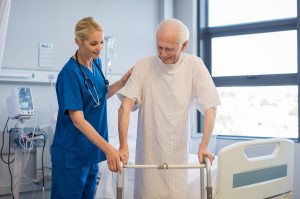 Ambulation is the ability to walk from place to place independently, with or without assistive devices. Early walking is one of the most crucial things seniors can do after surgery to prevent postoperative complications. Walking is a low-intensity activity which is ideal for most seniors who are recovering from a surgery or other hospitalization. It does not require any special equipment and is the least harmful on the joints and back. Post-surgical ambulation provides a large range of benefits for all patients and especially seniors. This article will cover the benefits of early ambulation as well as the problems that can occur when patients are immobile after a surgery.
Ambulation is the ability to walk from place to place independently, with or without assistive devices. Early walking is one of the most crucial things seniors can do after surgery to prevent postoperative complications. Walking is a low-intensity activity which is ideal for most seniors who are recovering from a surgery or other hospitalization. It does not require any special equipment and is the least harmful on the joints and back. Post-surgical ambulation provides a large range of benefits for all patients and especially seniors. This article will cover the benefits of early ambulation as well as the problems that can occur when patients are immobile after a surgery.
Benefits of early ambulation after surgery:
• Walking promotes blood flow of oxygen throughout the body while maintaining normal breathing functions.
• Ambulation stimulates circulation which can help stop the development of stroke-causing blood clots.
• Walking improves blood flow which aids in quicker wound healing.
• The gastrointestinal, genitourinary, pulmonary and urinary tract functions are all improved by walking.
• Walking increases muscle tone and strength, especially those of the abdomen and ankles.
• Ambulation helps seniors with coordination, posture and balance. It also aids in joint flexibility, particularly in the knees, hips and ankles.
• Early ambulation can help increase seniors’ appetites after surgery.
• Walking improves the patient’s feelings of independence, their mood and their self-esteem.
• Patients that practice ambulation are usually discharged sooner.
Problems that can occur when there is no ambulation
• Pressure ulcers (bed sores) are much more common when patients are stationary for long periods of time.
• Patients who do not walk after surgery are more susceptible to urinary incontinence and infection. Patients who can get up and go to the bathroom are less likely to experience incontinence.
• When a person’s bones do not bear weight, they lose minerals which can lead to osteoporosis.
• Patients who do not walk around experience more stress than those who start early ambulation.
• Non-walking patients are more likely to develop venous stasis and deep venous thrombosis which is a risk factor for forming blood clots caused my immobility.
• Walking post-surgery decreases constipation and gas pain.
• Choosing not to walk after surgery can lead to a higher risk of lung problems and pneumonia for seniors. It also decreases their ability to fight off other infections.
Elderly patients in the hospital need to keep moving. It may seem like a simple thing, but a quick walk every hour or two can help prevent many serious problems. Not all medical centers and hospitals make an effort to get older patients up and moving after surgeries or illnesses. Even with the growing evidence and research that shows staying in bed can be harmful for seniors and lead to complications, many hospitals don’t put a high priority on making them walk.
OakBend Medical Center’s ACE unit is specially designed with seniors in mind. Their goal is to get patients healthy, comfortable and discharged as soon as possible so they can get back to their usual activities and lifestyles. Their ACE unit emphasizes early ambulation for all seniors in addition to daily physical therapy. The ACE care team is made up of professionals with geriatric expertise. OakBend Medical Center offers not only a NICHE (Nurses Improving Care for Healthsystem Elders) Certified Facility, it also includes the only Acute Care for the Elderly Unit in all of Fort Bend County. For more information please contact the ACE Unit at OakBend Medical Center by calling 281-341-3000.
